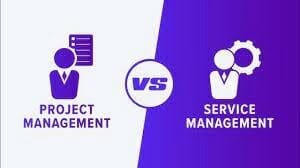While thinking about Service and Project, it triggered idea of exploring to understand the relationship between Service Management and Project Management.
This is a topic of interest to many people as on the surface both approaches seem to be fighting for some of the same work space in organizations. When we go back to the basic definitions of each, we can see that the two are not in conflict, rather are very complementary to each other.
Let us look at the definitions of Service and Service Management according to ITIL®.
Service: It is a means of delivering value to customers by facilitating outcomes customers want to achieve without the ownership of specific costs and risks.
Service management (SM): It is a set of specialized organizational capabilities for providing value to customers in the form of services.
Both of these definitions imply a chain of activities coming together over time to provide an outcome to a customer. These are ongoing ideas that provide both short term and long term benefits to customers. Services are outcomes [Impact of change], which are usually quantified and not output-based.
Following are some of the examples of quantification/KPIs of services –
- Customer Satisfaction (CSAT)
- Total Cost of Ownership (TCO) reduction through usage of service management
- Operational SLAs such as – Availability percentage (%), Reduction in incidents/calls count
- Number of services improvements planned versus actual implemented
- Availability percentage of solution and related KPIs such as MTBF & MTRS
- Number of releases per month/quarter
Now let us look at the definition of project and project management (according to PMBOK®).
Project: It is a temporary endeavour undertaken to create a unique product, service or result.
Project management: It is the application of knowledge, skills and techniques to execute projects effectively and efficiently.
These terms imply defined time frames with unique outputs delivered at the end of the time frame. Project Management includes the creation not just of software, but services, infrastructure, process, organization and just about any other output. Projects are output and not outcome based.
Following are some of the examples of KPIs of Projects –
- Schedule variance – Planned v/s Actual
- Effort Variance –Planned v/s Actual
- Cost Variance –Planned v/s Actual
- Quality / defect leakage to UAT to determine code quality
- Number of changes identified, accepted and implemented
- Risks identified, accessed, and implemented
When we put both these ideas together, we realize that a project is a method by which we design and transition services into existence. Projects are defined bursts of activity (including Development, Building, Testing and Delivery or Initiating, Planning, Executing, Controlling, and Closing (IPECC)) that result in the creation of services that bring value to the customer. [ITIL4’s SVS] thus project management is the short term control and guidance of projects that result in long term value-laden services.
Once a project completes its objective or goal of creating a service, then the project closes until we need to do the next burst of creation. When a project closes, then the activities associated with project management will end as well.[Closure of project (CP)]
As services have a lifecycle (repeatable, circular and long term), service management is an ongoing lifecycle based approach to strategising, designing, transitioning, operating and improving services to ensure long term, consistent and ongoing value to the customer. (termed as SS,SD,ST,SO & CSI) Service Management looks not just at the creation aspect of a service, but the entire lifecycle: conception, creation, growth, maturity and even retirement/decommission.
By looking at the above definitions, project work and the discipline of project management resides as one of the many methods that come together inside the overall lifecycle of a service (aka Service Lifecycle) to create value for customers.
In summary – Service Management and Project Management work very well together. Both are different sides of the same coin of enterprise with sole aim of creating value for customer.











